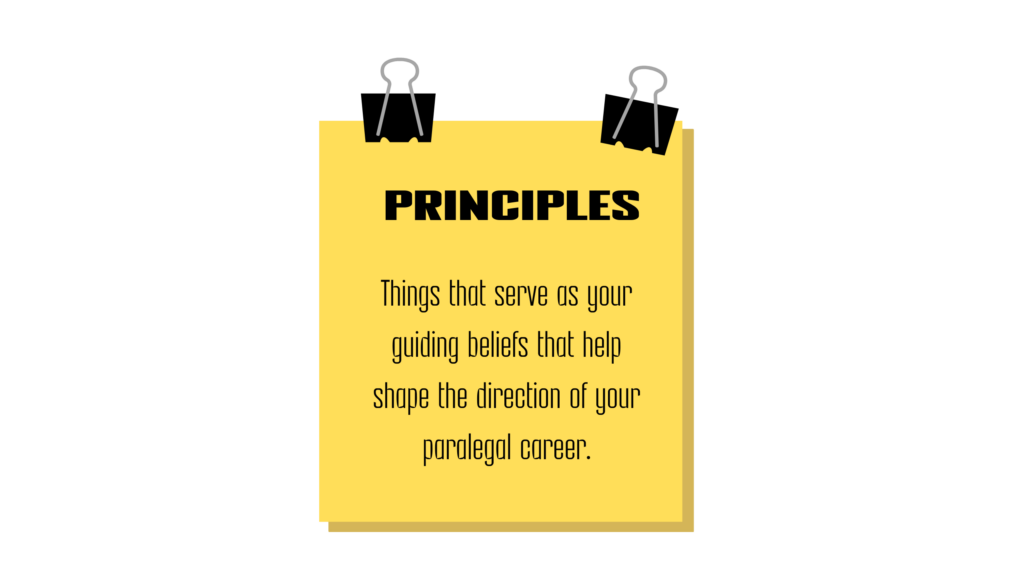Paralegal Training - Webinar Replay
Prefer to read instead?
As a paralegal, you play a critical role in the legal industry. Success in this demanding field requires not just skills but also the right principles to guide your career. Here are ten career-boosting principles for paralegals that can help you excel and enjoy a fulfilling career.
I’ve done various free paralegal training sessions on habits, skills, and paralegal traits – but I realized I’ve never done one on principles for paralegals.
What’s the difference?
HABITS, when done over time, contribute to you being more consistent. Here is the paralegal workshop I did on the 7 Habits of the Indispensable Paralegal.
SKILLS are your learned capabilities that make you more effective and efficient in a specific job-related task. Here is a paralegal training video I did on the paralegal skills that attorneys look for when hiring paralegals.
TRAITS are your natural characteristics. They are often intrinsic, like your sense of humor.

1. Do work that you enjoy
Why Enjoying Your Work Matters
Loving your work is key to building a successful and rewarding career. As Confucius said, “Choose a job you love, and you’ll never have to work a day in your life.”
Enjoying your work doesn’t mean you’ll never face challenges—it means you’ll find fulfillment even during demanding times.
How to Find Work You Enjoy
• Consider Compensation: While pay matters, high salaries alone won’t guarantee job satisfaction.
• Evaluate Firm Size: A large firm offers different opportunities and challenges compared to a small one. Choose based on your preferences for workload, culture, and career goals.
• Explore Practice Areas: If litigation isn’t a fit, consider transactional work, estate planning, or intellectual property. Each practice area requires unique skills and offers distinct challenges.
• Assess Attorney Relationships: A good fit with the attorneys you work for can make all the difference. Look for teams where personalities and work styles align.
• Be Discerning During Interviews: Trust your instincts. If something feels off during an interview, it might not be the right fit.
2. Prioritize your physical and mental health
Recognizing the Importance of Self-Care
Your health is your most important asset. When life gets busy, it’s easy to let exercise, meditation, and other self-care habits slide. However, neglecting these can lead to burnout, which undermines both your well-being and your career.
👉 Early Signs of Burnout
• Chronic fatigue
• Forgetfulness or difficulty concentrating
• Increased susceptibility to illness
• Irritability or detachment
👍 Strategies to Prevent Burnout
• Set boundaries to protect your energy.
• Take breaks, even if only for five minutes, to recharge.
• Practice self-care daily, such as morning workouts or lunchtime meditation.
• Seek support from mentors, colleagues, or professionals.
3. Maintain a professional demeanor
The Role of Appearance and Behavior
Professionalism goes beyond wearing a suit. It encompasses how you dress, interact, and carry yourself in the workplace.
Tips for Maintaining Professionalism
• Attire: Even in casual offices, avoid being the most casually dressed person.
• Limit Personal Life Discussions: Stay friendly without oversharing.
• Body Language: Cultivate a calm demeanor that inspires confidence.
• Emotional Intelligence: Read the room and adapt your communication to the situation.
4. Surround yourself with supportive, like-minded people
You’ve heard the saying: You are the average of the five people you spend the most time with.
Nothing could be more true when it comes to working in the legal industry.
Are you surrounding yourself with people who complain all the time about firm management? Or are you spending time with other paralegals who enjoy their work and strive to excel in their paralegal role?
Types of People to Avoid
• Gossip Groups: If they gossip about others, they’ll gossip about you. Plus, the attorneys and members of management know who the gossipers are – so avoid being seen as “one of them.”
• Negative Nellies: Constant complainers can drag you down. There’s a reason why one bad apple can spoil the entire barrel!
• Blame-Shifters: These individuals never take responsibility and may eventually blame you for their mistakes.
• Knowledge Hoarders: Avoid those who refuse to share information out of fear of competition. I call this the “scarcity mindset” and I go into more detail about the scarcity mindset in the paralegal profession here.
5. Cultivate a growth mindset
This isn’t just for new paralegals. In fact, I’d say this principle is more important the more experienced you are.
You don’t want to be the 20 year paralegal who thinks there’s nothing left for you to learn because that paralegal with eight years of experience who’s been keeping up with the latest technology trends is now surpassing you at the eight year mark.
A fixed mindset is where you assume that your intelligence, your character, your creative abilities, they’re all static. Basically, you’re dealt a hand in life and that’s it. This is as far as you’re going to be able to go so there’s no sense in trying to improve anything.
On the other hand, the growth mindset is based on the idea that those essential skills and qualities are things that you can cultivate and grow through your efforts. It assumes that every one of us can change and improve.
The person who has the growth mindset is going to go further in their paralegal career.
How to foster a growth mindset
• Stay updated on the latest trends and technology in the legal field.
• Proactively seek opportunities for paralegal training and education.
• Embrace challenges as opportunities to sharpen your paralegal skills.
Personal Injury Paralegal Boot Camp
As a personal injury paralegal, you have an important role in the pre-litigation phase of your claim files.
But where do you even start when you’re managing 80+ active files?
This online course will give you all the tools to manage that heavy case load. It walks you through every phase of your personal injury claim files, from the case intake through the demand package and more.

6. Honor your commitments
When you honor your commitments, you send a clear message that you are trustworthy, reliable, and professional. This builds a foundation of respect and credibility in the workplace.
I like to think of this as commitments are like bricks. With each brick that you lay, you’re building a solid foundation of trust. That means when you tell a fellow paralegal that you’ll come in on Saturday to help out on this big project, you do it just like you would if the person asking was the managing partner of the firm.
7. Expect respect
While some of the other principles for paralegal success are about how you treat other people, this one is about how you should expect to be treated.
We’ve all read the horror stories in the paralegal social media groups from people who work in situations that are not ideal (to say the least!).
If you let people treat you with disrespect, it will be difficult to excel as a paralegal. First, it will cause you to lose confidence in your ability to be a rockstar paralegal. Second, you will be complacent with low raises and promotions because you won’t think you deserve anything better.
Remember the saying:
They will treat you how you let them treat you.
If you’re currently working in a difficult situation, these additional resources will be helpful:
8. Be accountable
I can tell you that every single attorney I’ve worked with in the last 30 years hates excuses. They end up tuning you out the minute that they think you’re giving excuses for something or trying to blame others. They don’t care who was at fault. They just want to get the job done and they want to get it done right.
What it looks like:
- No excuses
- Don’t blame others
- Be willing to accept constructive criticism
9. Learn from failures and setbacks
Every failure carries a lesson with it.
Let’s say that you miss a calendaring deadline. It’s a tough pill to swallow, I know, especially if it was something like a summary judgment deadline or something along those lines, but instead use it to dissect what went wrong.
Was it a calendaring error?
When you calculated the deadline, what can you do to make sure that doesn’t happen again?
Was it poor communication?
Or was it something in the drafting and editing process?
So maybe from that failure, you use that experience to create a system. That’s going to prevent future mistakes.
Do you want to reduce failures and setbacks? Check out some of our paralegal courses that can help with that.

Free Guide for
Personal Injury Paralegals
Are you ready to be a rockstar personal injury paralegal?
When you’re starting out, it’s hard to know where to even start. We’ve got you covered! Here is your checklist.
The Paralegal Boot Camp gives you 8 actionable steps to get you started right now on a path to success.
Our free guide shares the 8 steps you need to take right now to start standing out at your firm.
10. Lift up the paralegal profession
Have you heard other paralegals saying things to attorneys like “your former paralegal didn’t know what they were doing?”
When a paralegal does that to make themselves look better, it brings down the entire paralegal profession in the eyes of attorneys.
Instead, remember that everyone (including you) makes mistakes. One mistake that a paralegal made on a file that you are now taking over doesn’t make them a bad paralegal. And it certainly doesn’t need to be brought to the attorney’s attention.
Instead, think of ways to lift the paralegal profession in the eyes of the attorneys you work with.
When you speak highly of all paralegals, you have the opportunity to lift up the entire paralegal profession.
When you follow these guiding principles for paralegals, you are showing the world that this is what it looks like to be a paralegal!
Reviews of our Paralegal Courses
Meet the Author

Ann Pearson is the Founder of the Paralegal Boot Camp and host of the Paralegal Coach Podcast Show. Ann is passionate about promoting the paralegal profession.
Ann spent 20 years working as a paralegal manager and a litigation paralegal before opening the Paralegal Boot Camp in 2010.
Ann’s training programs focus on adding immediate value to a paralegal’s career and bridging the gap between what a paralegal learns in school and what they actually do on the job.
Visit the About Us Page to learn more about why Ann started the Paralegal Boot Camp.
















